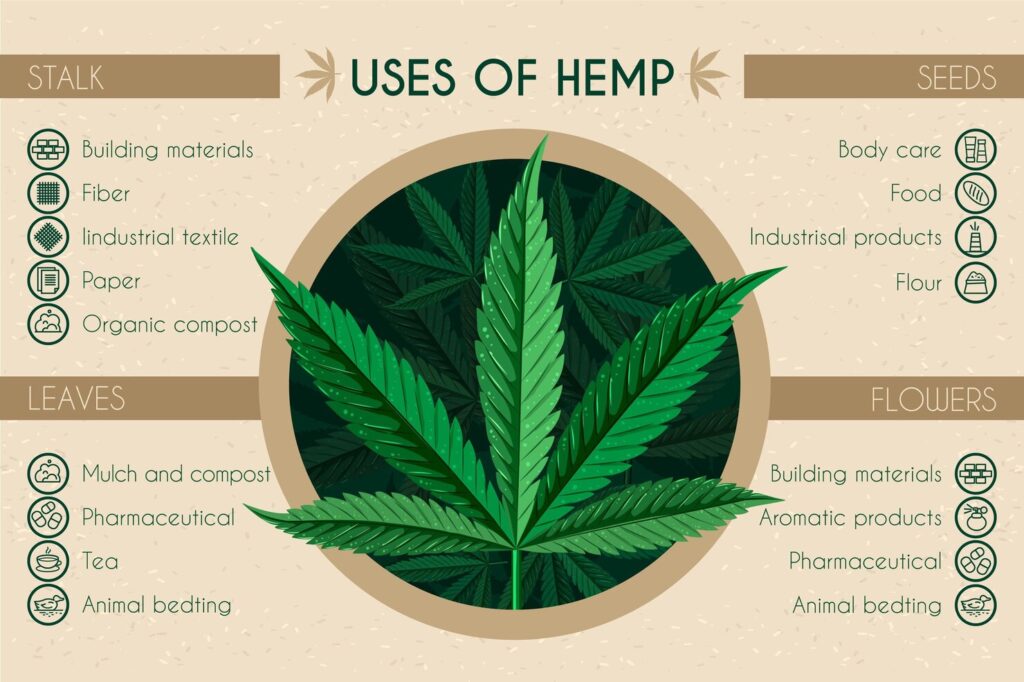What is Hemp and How is It Different from Cannabis?
Hemp is a term that often causes confusion. Is it cannabis, or is it something entirely different? The truth lies in the details of plant biology, legal definitions, and usage. Here’s a detailed look into what hemp is and how it stands apart from other forms of cannabis.
The Biological Perspective
Hemp and marijuana are both derived from the Cannabis sativa plant species. However, they are distinct strains with different physical and chemical properties. People cultivate Hemp primarily for its fibers, seeds, and oils, which are used in manufacturing a wide range of products, from textiles to health supplements.
Legal Definitions
The legal distinction between hemp and marijuana centers on the concentration of THC (tetrahydrocannabinol), the psychoactive compound found in cannabis plants. In many countries, hemp is defined as Cannabis sativa with a THC content of 0.3% or less by dry weight. This threshold is crucial for legal classification, as it differentiates non-psychoactive hemp from marijuana, which contains higher THC levels and is regulated differently.
Uses of Hemp
- Industrial Applications: Hemp’s strong fibers are used in making rope, clothing, and paper.
- Health and Nutrition: Hemp seeds and oil are rich in protein, fatty acids, and minerals, making them a valuable food supplement.
- Construction: Hempcrete, a material derived from hemp, is used in sustainable construction for its insulation properties.
Environmental Benefits
Hemp cultivation is known for its minimal environmental footprint. It requires less water than many crops, does not need high levels of pesticides or herbicides, and can improve soil health. Moreover, hemp absorbs CO2 as it grows, contributing to carbon sequestration.
Legal Status and Challenges
The legal status of hemp varies globally. In countries where it is legal, regulations focus on controlling THC levels. Despite its many benefits, hemp faces challenges such as association with marijuana, regulatory hurdles, and market competition.

How Is Hemp Processed and What Products Are Made from It?
The processing of hemp into various products is a multi-step procedure that varies depending on the end product. Here’s an overview of the process and the diverse range of products derived from hemp.
Processing Steps
- Harvesting: Hemp is harvested at the optimal time for the type of product being made (fiber, seed, or CBD oil).
- Retting: A process that breaks down the pectin in hemp stalks, making it easier to separate the fibers.
- Decortication: The fibers are separated from the core hurd.
- Refining: Fibers are further processed, depending on their intended use (textile, paper, etc.).
Product Range
- Textile Products: Clothing, bags, and linens.
- Construction Materials: Hempcrete and insulation.
- Health Products: CBD oils, tinctures, and topicals.
- Nutritional Products: Hemp seeds, protein powders, and oils.
Can Hemp Products Get You High?
One of the most common misconceptions about hemp is its psychoactive potential. Here, we address this concern directly.
THC Content in Hemp
Hemp contains THC levels of 0.3% or less, which is insufficient to produce the psychoactive effects associated with marijuana use. This low THC concentration is what legally distinguishes hemp from marijuana in many jurisdictions.
CBD vs. THC
- CBD: Non-psychoactive, associated with potential health benefits.
- THC: The psychoactive compound in cannabis that produces a “high.”
Consumer Guidance
When purchasing hemp products, consumers should look for reputable sources that provide third-party testing to ensure the product meets legal THC thresholds and is safe for consumption.
What Are the Medical and Therapeutic Benefits of Hemp?
Hemp’s medical and therapeutic benefits primarily stem from its CBD content, which has been studied for various health applications. Here’s a closer look at how hemp contributes to health and wellness.
Health Benefits of CBD
- Pain Management: CBD is explored for its effectiveness in reducing chronic pain and inflammation.
- Anxiety and Depression: Some studies suggest CBD can help alleviate anxiety and depression symptoms.
- Neuroprotective Properties: Research is ongoing into CBD’s potential to aid in neurological disorders such as epilepsy and multiple sclerosis.
Nutritional Benefits
- Hemp Seeds: A source of high-quality protein and essential fatty acids beneficial for heart health and immune system support.
- Hemp Oil: Used in dietary supplements for its nutrient content, including vitamins, minerals, and antioxidants.
Conclusion
Hemp’s journey from a misunderstood plant to a cornerstone of sustainable development and health illustrates the power of innovation, research, and changing perceptions. Its wide array of uses, from industrial applications to health and nutrition, alongside its environmental benefits, underscore hemp’s significance as a versatile and sustainable resource. As we move forward, the continued exploration and acceptance of hemp will undoubtedly contribute to more sustainable, healthy, and economically vibrant societies. The narrative of hemp is still being written, and its chapters promise to be filled with advancements, challenges, and opportunities that will shape the future of our planet.

